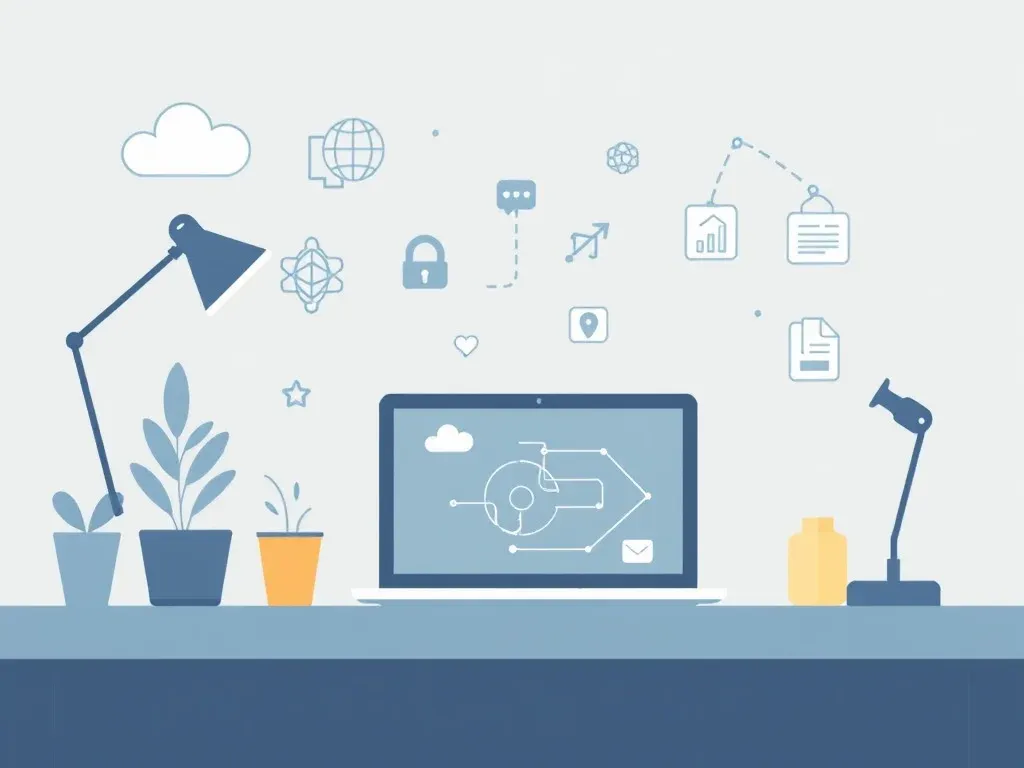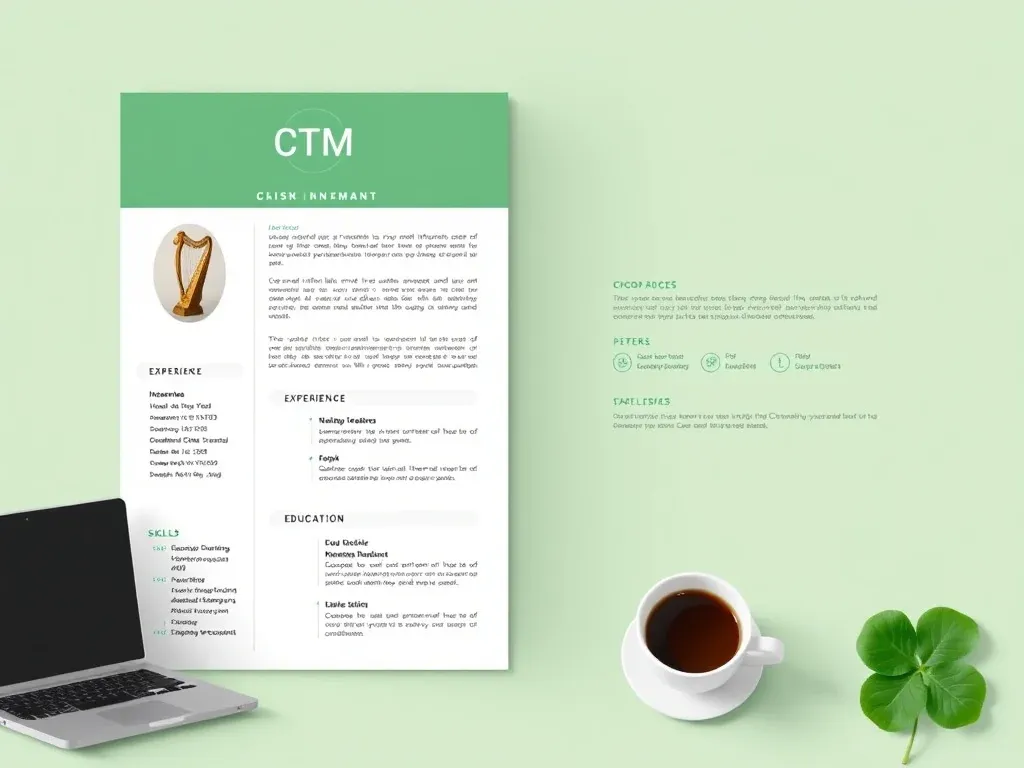Table of Contents
- Table of Contents
- Introduction
- The Remote Work Landscape in Ireland
- Current State of Remote Work
- Government Initiatives
- Benefits and Challenges
- Companies Offering Remote Work in Ireland
- Tech Companies
- Financial and Professional Services
- Fully Remote Companies
- Remote-Friendly Industries
- Legal Considerations for Remote Work
- Employment Rights
- Health and Safety
- Tax Implications
- Data Protection
- Finding Remote Job Opportunities
- Job Boards and Websites
- Company Career Pages
- Networking
- Recruitment Agencies
- Remote Job Application Tips
- Tailoring Your CV
- Cover Letter Strategies
- Portfolio and Online Presence
- Application Follow-up
- The Remote Interview Process
- Common Interview Formats
- Technical Preparation
- Demonstrating Remote Work Readiness
- Questions to Ask Employers
- Essential Skills for Remote Work Success
- Self-Management
- Communication
- Technical Aptitude
- Emotional Intelligence
- Boundary Management
- Setting Up Your Remote Workspace
- Workspace Essentials
- Technology Requirements
- Alternative Workspaces
- Security Considerations
- Maintaining Work-Life Balance
- Establishing Routines
- Digital Boundaries
- Physical and Mental Wellbeing
- Communication with Household Members
- Combating Isolation
- Career Growth in Remote Roles
- Visibility Strategies
- Professional Development
- Networking While Remote
- Performance Reviews and Advancement
- Challenges and Solutions
- Communication Barriers
- Isolation and Loneliness
- Productivity and Focus
- Technology and Infrastructure
- Future of Remote Work in Ireland
- Policy and Legislation
- Regional Development
- Technology Evolution
- Organizational Culture
- Conclusion
- Key Takeaways:
- Related Posts
Remote Work Opportunities in Ireland: A Comprehensive Guide
Reading time: 10 minutes
The landscape of work in Ireland has transformed dramatically in recent years, with remote work becoming increasingly mainstream. This guide explores the remote work opportunities available in Ireland, the companies embracing remote work policies, legal considerations, and practical advice for finding and thriving in remote positions.
Introduction
The COVID-19 pandemic accelerated a global shift toward remote work, and Ireland was no exception. What began as a temporary measure has evolved into a permanent transformation of the Irish workplace. Today, remote and hybrid work models have become standard offerings for many employers across the country.
This shift presents both opportunities and challenges for job seekers and employers alike. For workers, remote options offer greater flexibility, improved work-life balance, and access to opportunities regardless of geographic location. For employers, remote work policies help attract top talent, reduce overhead costs, and often lead to increased productivity and employee satisfaction.
In this comprehensive guide, we’ll explore the current state of remote work in Ireland, the types of remote opportunities available, and practical advice for finding, securing, and thriving in remote positions. Whether you’re a job seeker looking for remote opportunities, an employee hoping to transition to remote work, or an employer considering remote work policies, this guide will provide valuable insights into this evolving landscape.
Pro Tip:
Remote work doesn’t necessarily mean working from home all the time. Many Irish companies are adopting hybrid models that combine remote work with occasional office presence, giving employees the best of both worlds.
The Remote Work Landscape in Ireland
Ireland’s remote work landscape has evolved significantly in recent years, shaped by technological advancements, changing worker preferences, and government initiatives.
Current State of Remote Work
According to recent studies and surveys:
- Approximately 30% of employees in Ireland now work remotely at least part of the time
- Over 80% of workers who experienced remote work during the pandemic express a desire to continue with some form of remote arrangement
- Hybrid work models (combining remote and office work) have become the most popular arrangement
- The technology, financial services, and professional services sectors lead in remote work adoption
- Rural areas and smaller towns are seeing increased economic activity as remote workers relocate from urban centers
Government Initiatives
The Irish government has recognized the potential of remote work to address various economic and social challenges:
- National Remote Work Strategy: Launched in 2021, this strategy aims to make remote work a permanent option for many workers
- Connected Hubs Network: A nationwide network of over 200 remote working hubs providing professional workspaces in communities across Ireland
- Right to Request Remote Work Bill: Proposed legislation that would give employees the right to request remote working arrangements
- Tax incentives: Various tax reliefs for remote workers, including allowances for home office expenses
- Rural regeneration: Initiatives to leverage remote work for rural development and addressing regional imbalances
Types of Remote Work Arrangements:
- Fully remote: Work is performed entirely outside the traditional office, typically from home or co-working spaces
- Hybrid remote: A combination of remote and in-office work, with various models including:
- Fixed hybrid: Predetermined days in office/remote (e.g., Monday and Tuesday in office, rest remote)
- Flexible hybrid: Employee chooses when to work remotely within certain parameters
- Office-first hybrid: Primarily office-based with occasional remote work
- Remote-first hybrid: Primarily remote with occasional office attendance
- Digital nomad: Working remotely while traveling, often across different locations
- Hub-based remote: Working from designated co-working spaces or satellite offices
Benefits and Challenges
The shift to remote work offers numerous benefits but also presents challenges:
Benefits
- Reduced commuting time and costs
- Improved work-life balance
- Access to a wider talent pool for employers
- Potential for increased productivity
- Environmental benefits from reduced commuting
- Cost savings on office space for employers
- Greater flexibility in work schedules
- Regional development as workers relocate to rural areas
Challenges
- Potential for isolation and reduced social interaction
- Blurring of boundaries between work and personal life
- Communication and collaboration hurdles
- Technology and connectivity issues
- Maintaining company culture remotely
- Managing remote teams effectively
- Ensuring equal opportunities for remote and office workers
- Data security and privacy concerns
Companies Offering Remote Work in Ireland
A growing number of companies in Ireland offer remote or hybrid work arrangements. These range from multinational corporations to indigenous Irish companies and startups.
Tech Companies
The technology sector leads in remote work adoption:
- Shopify: Adopted a “digital by default” policy, allowing employees to work remotely permanently
- Dropbox: Implemented a “Virtual First” approach, making remote work the primary experience
- Hubspot: Offers flexible options including remote, office, and hybrid arrangements
- Stripe: Provides remote work options with occasional in-person collaboration
- Workhuman: Irish-founded company offering flexible work arrangements
- Glofox: Dublin-based company with remote-friendly policies
- Intercom: Offers hybrid work models for its employees
Financial and Professional Services
Many financial institutions and professional service firms have embraced remote work:
- PwC Ireland: Implemented a flexible working policy called “Everyday Flexibility”
- Deloitte Ireland: Offers hybrid working arrangements
- Bank of Ireland: Adopted a hybrid working model
- AIB: Provides flexible working options for employees
- Accenture: Offers various flexible working arrangements
- Mastercard: Provides flexible work options at its Dublin tech hub
Fully Remote Companies
Some companies operate on a fully remote basis:
- GitLab: A fully remote company with team members in Ireland
- Automattic (WordPress parent company): Distributed company with Irish employees
- Buffer: Remote-first company with no physical offices
- Zapier: Fully distributed company hiring in Ireland
- Toptal: Remote talent network with opportunities for Irish professionals
Pro Tip:
When researching potential employers, look beyond their stated remote work policies. Check employee reviews on platforms like Glassdoor to understand how remote-friendly the company culture truly is in practice.
Remote-Friendly Industries
Some industries are particularly well-suited to remote work:
- Software development and IT: Programming, web development, IT support, cybersecurity
- Digital marketing: Content creation, SEO, social media management, PPC advertising
- Customer support: Help desk, technical support, customer service
- Finance and accounting: Bookkeeping, financial analysis, accounting
- Creative services: Graphic design, video editing, animation
- Writing and editing: Content writing, copywriting, editing, translation
- Project management: Coordinating teams and projects remotely
- Sales: Inside sales, account management, business development
- Education and training: Online teaching, course development, corporate training
Legal Considerations for Remote Work
Remote work arrangements in Ireland are subject to various legal considerations that both employers and employees should understand:
Employment Rights
Remote workers in Ireland maintain the same fundamental employment rights as office-based workers:
- Working time regulations: The Organisation of Working Time Act applies to remote workers, including provisions regarding maximum working hours, breaks, and rest periods
- Equal treatment: Remote workers should receive equal treatment regarding pay, training, promotion opportunities, and other employment conditions
- Health and safety: Employers maintain responsibility for employee health and safety, even when working remotely
- Right to disconnect: The Workplace Relations Commission’s Code of Practice includes the right to disconnect from work communications outside normal working hours
Health and Safety
Employers have specific obligations regarding the health and safety of remote workers:
- Risk assessment: Employers should assess the suitability of the remote working environment
- Equipment provision: Ensuring employees have appropriate equipment and tools to work safely
- Ergonomic guidance: Providing information on setting up an ergonomic workspace
- Mental health support: Addressing potential isolation and stress associated with remote work
- Insurance coverage: Ensuring appropriate insurance coverage for remote work activities
Remote Work Agreement:
A formal remote work agreement should address:
- Working hours and availability: When the employee is expected to be working and available
- Communication expectations: How and when employees should communicate with colleagues and managers
- Performance measurement: How work will be assigned and evaluated
- Equipment and expenses: What the employer will provide and what expenses may be reimbursed
- Data security requirements: Measures to protect sensitive information
- Right to disconnect: Boundaries between work and personal time
- Office attendance: Any requirements for occasional office presence
- Termination conditions: Circumstances under which the remote arrangement might end
Tax Implications
Remote work can have various tax implications:
- e-Working tax relief: Remote workers may claim tax relief on certain expenses including electricity, heating, and broadband
- Employer-provided equipment: Generally not considered a taxable benefit if primarily for business use
- Home office expenses: Self-employed individuals working from home may claim a portion of household expenses as business costs
- Cross-border considerations: Working remotely from another country can trigger complex tax residency and social security issues
Pro Tip:
Keep detailed records of your home office expenses and working days if you plan to claim e-Working tax relief. Revenue’s guidelines on eligible expenses change periodically, so check the latest information on the Revenue.ie website.
Data Protection
Remote work creates additional data protection considerations:
- GDPR compliance: Remote work must comply with General Data Protection Regulation requirements
- Secure connections: Using VPNs and secure networks when accessing company systems
- Physical document security: Proper handling and disposal of physical documents containing sensitive information
- Device security: Ensuring work devices are password-protected and encrypted
- Privacy in shared spaces: Taking precautions when working in shared living spaces or public areas
Finding Remote Job Opportunities
Discovering remote work opportunities in Ireland requires a strategic approach and knowledge of where to look:
Job Boards and Websites
Several platforms specialize in remote job listings:
- JobVacancies.ie: Offers a dedicated remote work filter for Irish job seekers
- IrishJobs.ie: Features remote and hybrid positions across various sectors
- Indeed Ireland: Allows filtering for remote positions
- LinkedIn: Use the “Remote” location filter to find remote opportunities
- Remote.io: Specializes in remote tech jobs, many available to Irish workers
- We Work Remotely: Global remote job board with opportunities open to Irish residents
- Grow Remote: Irish organization connecting remote workers with employment opportunities
- Flexjobs: Curated remote and flexible job listings (paid subscription)
Company Career Pages
Many companies list remote positions directly on their websites:
- Check the careers pages of companies known for remote-friendly policies
- Look for terms like “remote,” “work from home,” “distributed,” or “location-independent”
- Some companies maintain a separate section for remote opportunities
- Consider setting up job alerts for companies you’re interested in
Search Strategies:
Effective search terms for finding remote positions:
- “Remote” + your job title (e.g., “remote software developer”)
- “Work from home” + your industry
- “Hybrid” + your location + your role
- “Distributed team” + your specialization
- “Remote-first” or “remote-friendly” + your field
- “Ireland” + “remote” + your profession
Networking
Many remote opportunities are found through networking:
- LinkedIn: Connect with recruiters and professionals at remote-friendly companies
- Remote work communities: Join groups like Grow Remote Ireland or Remote Workers Ireland
- Virtual meetups and events: Attend online networking events focused on your industry
- Professional associations: Many industry groups share remote opportunities with members
- Co-working spaces: Connect with other remote workers who may know of opportunities
Recruitment Agencies
Some recruitment agencies specialize in remote placements:
- Abodoo: Irish platform matching candidates with remote and flexible roles
- Prosperity: Recruitment agency with a focus on flexible working arrangements
- Morgan McKinley: Places professionals in remote and hybrid positions
- Sigmar Recruitment: Offers remote and flexible work opportunities
- CPL: Recruits for various remote positions across industries
Pro Tip:
When searching for remote jobs, pay close attention to geographic restrictions. Some “remote” positions may still require you to be based in a specific country or region for legal, tax, or time zone reasons. Look for terms like “remote – Ireland” or “remote – EU” to understand the location requirements.
Remote Job Application Tips
Applying for remote positions requires highlighting specific skills and experiences that demonstrate your ability to work effectively outside a traditional office environment:
Tailoring Your CV
Adapt your CV to emphasize remote work readiness:
- Highlight previous remote experience: Explicitly mention any remote or hybrid work arrangements in past roles
- Showcase relevant skills: Emphasize self-management, digital communication, and technology proficiency
- Quantify remote achievements: Include metrics that demonstrate your productivity and effectiveness when working remotely
- List relevant tools: Mention experience with collaboration tools like Slack, Microsoft Teams, Zoom, Asana, Trello, etc.
- Address potential concerns: Proactively demonstrate how you overcome common remote work challenges
Remote-Specific Skills to Highlight:
- Self-motivation: Ability to stay productive without direct supervision
- Written communication: Clear and effective written expression
- Time management: Organizing and prioritizing work independently
- Digital collaboration: Experience with virtual teamwork
- Problem-solving: Resolving issues independently
- Adaptability: Adjusting to changing circumstances and requirements
- Technical troubleshooting: Resolving basic IT issues independently
- Results-oriented approach: Focus on outcomes rather than activities
Cover Letter Strategies
Your cover letter should address remote-specific considerations:
- Express your remote work motivation: Explain why you’re specifically interested in remote work
- Describe your remote workspace: Briefly mention your dedicated home office or work setup
- Address potential employer concerns: Proactively explain how you maintain productivity, communication, and work-life boundaries
- Demonstrate cultural fit: Research the company’s remote culture and show how you align with it
- Highlight relevant experience: Provide specific examples of successful remote work or independent projects
Pro Tip:
In your application, address the “why remote” question before employers ask it. Explain how remote work enhances your productivity or work quality, rather than focusing solely on personal benefits like commute reduction or flexibility.
Portfolio and Online Presence
For remote positions, your digital presence becomes even more important:
- LinkedIn profile: Ensure it’s complete, professional, and highlights remote-relevant skills
- Online portfolio: Showcase relevant work samples and projects
- GitHub/coding repositories: For technical roles, maintain active repositories demonstrating your work
- Personal website: Consider creating a professional site highlighting your expertise
- Social media audit: Ensure your public profiles present a professional image
Application Follow-up
Following up appropriately can demonstrate your communication skills:
- Wait 1-2 weeks before following up on applications
- Keep follow-up emails concise, professional, and specific to the role
- Demonstrate enthusiasm without appearing desperate
- Use the opportunity to provide any additional relevant information
- Be mindful of time zones if applying to companies with distributed teams
The Remote Interview Process
Remote job interviews often follow different formats and focus on specific aspects of your experience and working style:
Common Interview Formats
Remote positions typically involve multiple interview stages:
- Initial screening: Often a brief video or phone call with HR or a recruiter
- Technical assessment: Skills tests, coding challenges, or portfolio reviews
- Asynchronous interviews: Recorded video responses to predetermined questions
- Panel interviews: Video meetings with multiple team members
- Trial projects: Paid or unpaid assignments to demonstrate your skills
- Cultural fit interviews: Conversations focused on work style and values alignment
Technical Preparation
Ensure your technology is ready for remote interviews:
- Test your equipment: Verify your camera, microphone, and internet connection work properly
- Install required software: Download and test any video conferencing platforms in advance
- Prepare your space: Ensure your background is professional and well-lit
- Minimize distractions: Inform household members about your interview, silence notifications
- Have a backup plan: Be prepared with alternative communication methods if technical issues arise
Common Remote Interview Questions:
- “Describe your experience working remotely.”
- “How do you structure your workday when working from home?”
- “How do you maintain communication with team members when working remotely?”
- “What challenges have you faced working remotely, and how did you overcome them?”
- “How do you stay motivated and productive outside a traditional office environment?”
- “Describe your home office setup.”
- “How do you manage work-life boundaries when working from home?”
- “How do you handle technical issues when working remotely?”
- “How would you build relationships with colleagues you rarely or never meet in person?”
Demonstrating Remote Work Readiness
Show interviewers you’re prepared for remote work:
- Communication skills: Demonstrate clear, concise communication during the interview
- Self-awareness: Show understanding of your working style and productivity patterns
- Problem-solving: Provide examples of overcoming challenges independently
- Technical aptitude: Display comfort with the technology used in the interview process
- Cultural alignment: Research and reference the company’s remote work culture
Pro Tip:
During remote interviews, your digital presence is your first impression. Arrive 5-10 minutes early to test your connection, use a professional username, maintain good posture and eye contact with the camera (not the screen), and ensure your environment reflects your professional approach.
Questions to Ask Employers
Prepare thoughtful questions about the remote work experience:
- “How does the team maintain communication and collaboration while working remotely?”
- “What tools and technologies does the company use to support remote work?”
- “How is performance measured and evaluated for remote employees?”
- “What is the expected work schedule and availability for this position?”
- “How does the company support remote employees’ professional development?”
- “Are there any expectations for occasional office visits or in-person meetings?”
- “How does the company approach work-life balance for remote employees?”
- “What are the biggest challenges the team faces with remote work, and how are they addressed?”
Essential Skills for Remote Work Success
Thriving in a remote work environment requires specific skills and competencies:
Self-Management
The ability to work effectively without direct supervision:
- Self-motivation: Maintaining productivity and engagement without external prompting
- Time management: Structuring your day and meeting deadlines independently
- Focus: Minimizing distractions and maintaining concentration
- Prioritization: Identifying and focusing on the most important tasks
- Accountability: Taking ownership of your work and commitments
Communication
Effective remote communication requires additional skills:
- Written communication: Expressing ideas clearly and concisely in writing
- Proactive updates: Keeping team members informed without being asked
- Active listening: Paying full attention during virtual meetings
- Asking good questions: Clarifying ambiguities promptly
- Communication tool proficiency: Effectively using various digital communication platforms
- Asynchronous communication: Providing context and complete information when real-time responses aren’t possible
Digital Collaboration Tools:
Familiarity with these tools is increasingly essential for remote work:
- Communication: Slack, Microsoft Teams, Discord, Zoom, Google Meet
- Project management: Asana, Trello, Monday.com, Jira, ClickUp
- Document collaboration: Google Workspace, Microsoft 365, Notion, Confluence
- File sharing: Dropbox, Google Drive, OneDrive, Box
- Visual collaboration: Miro, Figma, MURAL, Lucidchart
- Time tracking: Toggl, Harvest, Time Doctor
- Password management: LastPass, 1Password, Bitwarden
Technical Aptitude
Remote workers need sufficient technical skills to work independently:
- Basic troubleshooting: Resolving common computer and internet issues
- Digital security awareness: Following best practices for data protection
- Software adaptability: Learning new tools and platforms quickly
- Digital organization: Managing files and information effectively
- Home network management: Ensuring reliable internet connectivity
Emotional Intelligence
Remote work requires heightened emotional awareness:
- Self-awareness: Understanding your emotional states and their impact
- Empathy: Considering others’ perspectives and challenges
- Relationship management: Building and maintaining connections virtually
- Conflict resolution: Addressing misunderstandings constructively
- Resilience: Bouncing back from setbacks and challenges
Pro Tip:
In remote work environments, your written communication becomes your primary representation. Invest time in developing clear, concise writing skills and learn to convey tone appropriately in text-based communications. Consider how your messages might be interpreted without the benefit of facial expressions or vocal cues.
Boundary Management
Creating effective separation between work and personal life:
- Physical boundaries: Designating specific work spaces
- Temporal boundaries: Establishing and maintaining work hours
- Psychological boundaries: Mentally transitioning between work and personal modes
- Digital boundaries: Managing notifications and availability
- Social boundaries: Communicating your work needs to household members
Setting Up Your Remote Workspace
Creating an effective home office environment is crucial for remote work success:
Workspace Essentials
Key components of a productive home office:
- Dedicated space: A consistent location used primarily or exclusively for work
- Ergonomic furniture: A proper desk and chair that support good posture
- Adequate lighting: Natural light when possible, supplemented with proper artificial lighting
- Technology setup: Computer, monitor(s), keyboard, mouse, headphones with microphone
- Internet connection: Reliable, high-speed broadband with backup options if possible
- Organization systems: Storage solutions to keep your workspace tidy
- Background considerations: Professional appearance for video calls
Ergonomic Considerations:
- Chair height: Feet flat on floor, knees at 90-degree angle
- Desk height: Elbows at 90-degree angle when typing
- Monitor position: Top of screen at or slightly below eye level, arm’s length away
- Keyboard and mouse: Positioned to keep wrists straight
- Lighting: Positioned to avoid glare on screens
- Regular movement: Standing or changing positions periodically
Technology Requirements
Essential technology for effective remote work:
- Computer: Laptop or desktop that meets your job requirements
- Internet connection: Minimum 50-100 Mbps download/10 Mbps upload for video conferencing
- Backup internet option: Mobile hotspot or alternative connection method
- Webcam: Good quality camera for video meetings
- Audio equipment: Headphones with microphone to reduce background noise
- Surge protector: To protect equipment from power fluctuations
- Uninterruptible power supply (UPS): For areas with unreliable electricity
Alternative Workspaces
Options for those without dedicated home office space:
- Co-working spaces: Shared professional environments with amenities
- Connected Hubs network: Government-supported remote working hubs across Ireland
- Libraries: Many offer quiet spaces and free Wi-Fi
- Cafés: Suitable for occasional use, though consider noise levels and privacy
- Convertible spaces: Areas in your home that can transform between work and personal use
Pro Tip:
If space is limited, consider a “work in a box” approach where your work equipment is stored in a container that can be set up and packed away daily. This helps create psychological boundaries between work and personal time, even without a dedicated office space.
Security Considerations
Protecting sensitive information when working remotely:
- Secure Wi-Fi: Use password-protected networks with WPA2 or WPA3 encryption
- VPN: Use a virtual private network when accessing company resources
- Password management: Use strong, unique passwords and two-factor authentication
- Screen privacy: Position screens to prevent visual access by others
- Physical security: Secure equipment when not in use, especially in shared spaces
- Regular updates: Keep operating systems and software current with security patches
- Data backup: Regularly back up important work files
Maintaining Work-Life Balance
One of the biggest challenges of remote work is maintaining healthy boundaries between professional and personal life:
Establishing Routines
Structured routines help create necessary boundaries:
- Consistent schedule: Set regular working hours when possible
- Morning routine: Create rituals that prepare you for the workday
- Breaks: Schedule regular short breaks throughout the day
- End-of-day ritual: Develop a consistent way to signal the end of work
- Physical transitions: Consider a short walk or activity to separate work and personal time
Digital Boundaries
Managing technology to prevent work from encroaching on personal time:
- Notification management: Turn off work notifications outside working hours
- Separate accounts: Use different browsers or profiles for work and personal use
- Email boundaries: Avoid checking work email during personal time
- App settings: Utilize “do not disturb” and focus modes
- Device separation: Use separate devices for work and personal activities when possible
Signs of Poor Work-Life Balance:
- Regularly working significantly longer than contracted hours
- Difficulty “switching off” from work thoughts
- Checking work communications during personal time
- Neglecting personal relationships or self-care
- Feeling guilty when not working
- Physical symptoms like headaches, sleep disturbances, or persistent fatigue
- Decreased job satisfaction or increased cynicism
Physical and Mental Wellbeing
Prioritizing health when working remotely:
- Regular movement: Schedule physical activity throughout the day
- Ergonomic awareness: Maintain good posture and ergonomic setup
- Eye care: Follow the 20-20-20 rule (every 20 minutes, look at something 20 feet away for 20 seconds)
- Hydration and nutrition: Maintain healthy eating and drinking habits
- Outdoor time: Spend time outside daily, especially in natural settings
- Social connection: Actively maintain relationships to prevent isolation
- Mindfulness practices: Incorporate stress-reduction techniques into your routine
Pro Tip:
Create a “fake commute” at the beginning and end of your workday. Use this time (15-30 minutes) for a walk, reading, or another activity that creates a psychological buffer between work and personal time. This replaces the natural transition that a physical commute provides.
Communication with Household Members
Establishing understanding with those you live with:
- Clearly communicate your working hours and needs
- Establish signals for when you shouldn’t be interrupted
- Create shared understanding about noise levels and shared spaces
- Involve family members in creating workable solutions
- Regularly review and adjust arrangements as needed
Combating Isolation
Strategies to maintain social connection while working remotely:
- Virtual social events: Participate in online team building and social activities
- Co-working days: Arrange to work alongside colleagues or friends occasionally
- Professional communities: Join industry groups or remote worker networks
- Local connections: Build relationships in your local community
- Scheduled social time: Proactively plan social interactions
- Varied work locations: Occasionally work from cafés or co-working spaces
Career Growth in Remote Roles
Working remotely doesn’t mean sacrificing professional development. Here’s how to ensure continued career growth:
Visibility Strategies
Ensuring your contributions are recognized when working remotely:
- Regular updates: Proactively communicate progress and achievements
- Documentation: Keep records of your accomplishments and positive feedback
- Active participation: Contribute meaningfully in virtual meetings
- Knowledge sharing: Volunteer to present or lead discussions in your area of expertise
- Cross-functional collaboration: Work with colleagues from different teams or departments
- Results focus: Emphasize outcomes and impact rather than activity
Professional Development
Continuing to grow your skills and knowledge:
- Online learning: Take advantage of virtual courses, webinars, and tutorials
- Virtual conferences: Participate in industry events and networking opportunities
- Internal training: Utilize company-provided learning resources
- Mentorship: Seek virtual mentoring relationships
- Skill-sharing: Exchange knowledge with colleagues through virtual sessions
- Professional certifications: Pursue relevant credentials in your field
- Reading and research: Stay current with industry publications and research
Remote-Specific Career Paths:
Some career directions particularly suited to remote work:
- Remote team leadership: Managing distributed teams
- Digital project management: Coordinating virtual projects and workflows
- Remote work consulting: Advising on effective remote work practices
- Virtual collaboration expertise: Specializing in tools and methods for distributed teams
- Digital learning and development: Creating and delivering virtual training
- Remote operations management: Optimizing processes for distributed organizations
Networking While Remote
Building and maintaining professional relationships:
- Virtual coffee chats: Schedule informal conversations with colleagues and industry contacts
- Online communities: Participate in industry-specific forums, Slack groups, or social media communities
- Virtual events: Attend online conferences, webinars, and networking sessions
- Professional organizations: Join and actively participate in industry associations
- Content creation: Share your expertise through articles, blog posts, or social media
- Local connections: Network with professionals in your geographic area
- Alumni networks: Engage with former colleagues and educational connections
Pro Tip:
Schedule regular one-on-one meetings with your manager to discuss your career goals and progress. In remote environments, these conversations may not happen organically, so being proactive about your development is essential.
Performance Reviews and Advancement
Navigating evaluation and promotion processes remotely:
- Maintain a “success journal” documenting your achievements and positive feedback
- Request clear performance metrics and expectations
- Prepare thoroughly for performance discussions with specific examples
- Seek regular feedback rather than waiting for formal reviews
- Discuss career advancement opportunities proactively
- Identify and communicate your interest in specific growth opportunities
Challenges and Solutions
Remote work presents unique challenges. Here are common issues and effective strategies to address them:
Communication Barriers
Overcoming challenges in remote communication:
- Challenge: Missing nonverbal cues and context
- Solutions:
- Use video calls when possible for important discussions
- Be explicit about tone and intent in written communications
- Ask clarifying questions rather than making assumptions
- Use emojis and GIFs thoughtfully to convey tone
- Establish team communication norms and expectations
Isolation and Loneliness
Addressing the social aspects of remote work:
- Challenge: Feeling disconnected from colleagues and missing workplace social interaction
- Solutions:
- Schedule regular virtual social events with colleagues
- Join remote worker communities or co-working spaces
- Build non-work social connections in your local community
- Consider a hybrid arrangement if possible
- Use collaboration tools that facilitate casual interaction
Common Remote Work Challenges:
- Distractions: Household activities, family needs, personal tasks
- Technology issues: Internet problems, software glitches, hardware failures
- Collaboration difficulties: Coordinating across time zones, asynchronous work
- Work-life boundaries: Difficulty separating professional and personal life
- Visibility concerns: Worry about recognition and career advancement
- Motivation fluctuations: Maintaining consistent productivity and engagement
Productivity and Focus
Maintaining effectiveness when working remotely:
- Challenge: Distractions and difficulty maintaining focus
- Solutions:
- Implement time management techniques like Pomodoro (25 minutes of focus followed by a 5-minute break)
- Use website blockers or focus apps during deep work periods
- Communicate boundaries clearly with household members
- Create a dedicated workspace with minimal distractions
- Identify your peak productivity hours and schedule important tasks accordingly
Technology and Infrastructure
Addressing technical challenges:
- Challenge: Internet reliability, equipment issues, and technical problems
- Solutions:
- Invest in the best internet connection you can afford
- Have a backup internet option (mobile hotspot, public Wi-Fi locations)
- Develop basic troubleshooting skills for common issues
- Keep equipment updated and maintained
- Have alternative communication methods available
Pro Tip:
Create a “contingency plan” for your most common remote work challenges. For example, if your home internet fails, know exactly where the nearest reliable Wi-Fi location is, or have a pre-configured mobile hotspot ready. Having these plans in place reduces stress when issues arise.
Future of Remote Work in Ireland
The remote work landscape in Ireland continues to evolve. Here are some emerging trends and predictions:
Policy and Legislation
Evolving regulatory framework:
- Implementation of the Right to Request Remote Work legislation
- Potential tax incentives to encourage remote work adoption
- Standardization of remote work policies across industries
- Enhanced protections for remote workers’ rights
- Cross-border employment regulations for international remote work
Regional Development
Impact on geographic distribution:
- Continued growth of regional hubs and co-working spaces
- Population shifts from Dublin to smaller cities and rural areas
- Revitalization of rural communities through digital nomad and remote worker influx
- Development of “remote work ready” communities with enhanced infrastructure
- Potential housing market adjustments reflecting new work patterns
Emerging Remote Work Models:
- Hub-and-spoke: Central office with satellite locations closer to employees’ homes
- Work-from-anywhere: Complete geographic flexibility, including international locations
- Asynchronous-first: Prioritizing flexibility in when work happens, not just where
- Results-only work environment: Focus on outcomes rather than hours worked or location
- Four-day workweek: Compressed schedules combined with remote flexibility
Technology Evolution
Technological advancements shaping remote work:
- Virtual reality and augmented reality for immersive collaboration
- Advanced AI assistants for productivity and communication
- Enhanced cybersecurity solutions for distributed workforces
- Improved digital wellness tools to combat burnout
- Next-generation connectivity (5G, satellite internet) enabling work from truly remote locations
Organizational Culture
Evolving workplace practices:
- Development of remote-first company cultures
- Increased emphasis on results rather than presence
- Evolution of management practices for distributed teams
- New approaches to team building and social connection
- Greater focus on employee wellbeing and work-life integration
Pro Tip:
Stay adaptable in your remote work approach. The most successful remote workers will be those who can evolve with changing technologies, policies, and best practices. Regularly reassess your remote work setup, skills, and strategies to ensure they remain effective.
Conclusion
Remote work has become a permanent and significant feature of Ireland’s employment landscape. The shift toward flexible work arrangements offers tremendous opportunities for both employees and employers, from improved work-life balance to access to broader talent pools and reduced overhead costs.
While remote work presents challenges—from communication barriers to potential isolation—these can be effectively addressed with the right strategies, tools, and mindsets. By creating appropriate boundaries, maintaining effective communication, and proactively managing your career development, you can thrive in a remote work environment.
As Ireland continues to embrace and adapt to remote work, staying informed about evolving policies, technologies, and best practices will be essential. Whether you’re seeking remote opportunities, transitioning to remote work, or managing remote teams, the principles outlined in this guide can help you navigate this new world of work successfully.
Remember that remote work isn’t one-size-fits-all. The most effective approach will depend on your individual circumstances, preferences, and job requirements. Experiment with different strategies to find what works best for you, and be willing to adapt as your needs and the remote work landscape continue to evolve.
Key Takeaways:
- Remote work in Ireland is supported by government initiatives and embraced by companies across various sectors
- Finding remote opportunities requires strategic searching, networking, and highlighting relevant skills
- Success in remote work depends on self-management, communication, and technical aptitude
- Creating an effective workspace and maintaining work-life boundaries are essential for remote work wellbeing
- Career growth remains possible in remote settings with proactive visibility and development strategies
- Common challenges can be overcome with thoughtful planning and appropriate tools
- The future of remote work in Ireland looks promising, with continued evolution in policies, technologies, and practices
As you embark on or continue your remote work journey, remember that JobVacancies.ie offers numerous remote and flexible opportunities across Ireland. Our platform allows you to filter specifically for remote positions, making it easier to find the right fit for your skills and preferences.
We wish you success in your remote work endeavors and invite you to explore our current remote job listings to discover your next opportunity.








